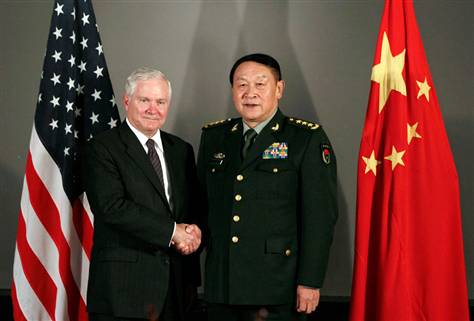US Defense Secretary Robert Gates launched a series of meetings with top Chinese generals Monday in a bid to shore up rocky military ties with Beijing, amid US concern over China’s advanced weaponry.
The trip to China by Gates, his first since 2007, comes just days ahead of a crucial visit to Washington by Chinese President Hu Jintao, and both sides are keen to show some progress in defence ties.
The Pentagon chief sat down early Monday with China’s defence minister, General Liang Guanglie, China’s Xinhua news agency reported.
Beijing broke off military relations with the United States a year ago over Washington’s sale of more than $6 billion in arms to rival Taiwan, and tentative plans for an earlier visit by Gates were called off.
US officials, including Gates, have for years appealed to China to embrace a permanent dialogue between military leaders regardless of political disputes, but the Chinese have tended to view defence relations as a bargaining chip.
China is riding an economic boom and flexing its military might, with ambitious plans to invest in sophisticated aircraft, missiles, ships and submarines.
Two weeks ago, Liang vowed to keep up investments in new weapons, saying China would “push forward preparations for military conflict in every strategic direction”.
The United States, however, is under mounting fiscal strain, forced to cut back some weapons programmes even as it fights a grinding war in Afghanistan and still has tens of thousands of troops in Iraq.
Before arriving late Sunday for three days of talks, Gates said he would appeal for a reliable security dialogue with China to avoid possible miscalculations, but expressed concern over the Asian power’s anti-ship missiles and a new stealth fighter jet.
“They clearly have the potential to put some of our capabilities at risk. And we have to pay attention to them, we have to respond appropriately with our own programmes,” Gates told reporters travelling on his plane.
“My hope is that, through the strategic dialogue that I’m talking about, that maybe the need for some of these capabilities is reduced,” he said.
Photos surfaced in recent days of what appears to be China’s first stealth fighter jet — a development that has highlighted China’s military modernisation, as well as concerns in the region over its intentions.
Japan last month labelled Beijing’s military build-up a global “concern”, citing its increased assertiveness in the East and South China seas.
China has repeatedly insisted its military growth does not pose any threat.
Experts say the J-20 fighter will eventually rival the US Air Force’s F-22, the world’s only fully operational next-generation stealth fighter jet — and Gates admitted Beijing had made more progress than previously thought.
“What we’ve seen is they may be somewhat further along in the development of that aircraft than our intelligence had predicted,” he said.
Western military analysts say China is developing an anti-ship ballistic missile — a new version of its Dongfeng 21 missile — that could pierce the defences of even the most sturdy US naval ships and has a range far beyond Chinese waters.
The talks were also expected to cover recent tensions on the Korean peninsula, including China’s role in helping to ease a recent crisis that began after Pyongyang’s deadly shelling of a South Korean island in November.
After his talks in China, Gates heads to Tokyo on Wednesday and Seoul on Friday for meetings focused on the Korean crisis.










